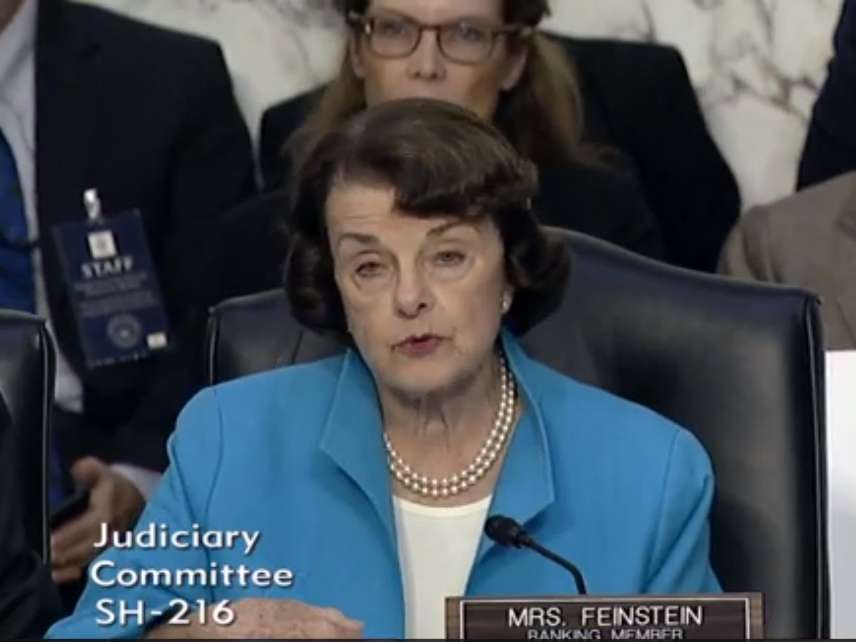Dianne Feinstein Wants Brett Kavanaugh to 'Reconcile' His Second Amendment Reasoning With 'Hundreds of School Shootings' That Never Happened
The senator is miffed that the SCOTUS nominee thinks people have a right to own the guns she wants to ban.

Yesterday Sen. Dianne Feinstein (D-Calif.), who wrote the federal "assault weapon" ban that expired in 2004 and in recent years has been pushing a new, broader version of that law, asked Supreme Court nominee Brett Kavanaugh to explain why he concluded that such legislation is unconstitutional. After Kavanaugh recapped his reasoning (more on that in a minute), Feinstein replied, "How do you reconcile what you've just said with the hundreds of school shootings using assault weapons that have taken place in recent history?"
Feinstein's response was striking for two reasons. First, there have been nothing like "hundreds of school shootings using assault weapons," whether you look at "recent history" or go back half a century. Second, the shootings are irrelevant to the question of whether banning so-called assault weapons is consistent with the Second Amendment.
According to a database maintained by Mother Jones, there have been 101 "indiscriminate rampages in public places resulting in four or more victims killed by the attacker" since 1982. A Washington Post tally published last October, based on the FBI's definition of mass murder, identified "154 shootings in which four or more people were killed" since 1966. Only a small share of these attacks—16 of 101 in the Mother Jones database—occurred at schools, including universities. Just six of those 16 school attacks involved "assault weapons," which account for about a quarter of the firearms used by mass shooters, most of which are handguns.
Even if Feinstein had in mind a broader definition of school shooting, it is hard to see how she could get to "hundreds" involving "assault weapons." By her own count, 385 people were killed with "assault weapons" from 2004 through 2011 (which is about 0.5 percent of gun homicides during that period), and the vast majority of those murders did not occur in schools. If we assume that something like 16 percent of them did (in line with the Mother Jones numbers), that would be 60 or so murders involving "assault weapons" at schools over eight years, and the number of separate incidents would be even lower. It is difficult to escape the conclusion that Feinstein was just making shit up when she referred to "hundreds of school shootings using assault weapons that have taken place in recent history."
In any case, the number of school shootings has nothing to do with the question Kavanaugh was answering, which was why he dissented from a 2011 D.C. Circuit decision upholding the District of Columbia's "assault weapon" ban. As he noted in that opinion, the D.C. law (like Feinstein's bill) covered a "haphazard" set of arbitrarily selected guns "with no particular explanation or rationale for why some made the list and some did not." Kavanaugh concluded that the ban was inconsistent with District of Columbia v. Heller, the 2008 case in which the Supreme Court recognized that the Second Amendment guarantees an individual right to armed self-defense.
As Kavanaugh explained to Feinstein, Heller says the Second Amendment protects the right to keep handguns for self-defense, while allowing that bans on "dangerous and unusual" weapons—firearms that are not "in common use" for "lawful purposes"—would be constitutional. "Most handguns are semi-automatic," Kavanaugh observed. "The question was can you distinguish, as a matter of precedent," between semi-automatic handguns and semi-automatic rifles. He noted that "semi-automatic rifles are widely possessed in the United States; there are millions and millions." To Kavanaugh, that means the guns that Feinstein wants to ban are "in common use" for "lawful purposes" such as self-defense and hunting, so possession of them is protected by the Second Amendment.
Feinstein implausibly insisted that "assault weapons are not in common use," even though Americans own more than 16 million of them, only a tiny percentage of which will ever be used to commit crimes. She also suggested that Kavanaugh needed to "reconcile" his constitutional reasoning with the fact that such guns are sometimes used in school shootings, which makes no sense. As Kavanaugh noted in his 2011 dissent, handguns are used to murder people much more often than "assault weapons" are. The Supreme Court nevertheless held in Heller that Americans have a constitutional right to own handguns.
Either Kavanaugh applied Heller correctly or he didn't. The "hundreds of school shootings using assault weapons" that Feinstein invented have no bearing on that question.

Show Comments (238)